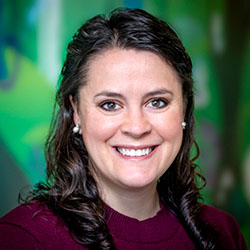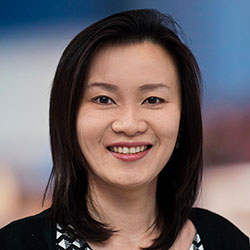Movement Disorders and Complex Tics Program
What are movement disorders?
Movement disorders happen when there’s a problem with the complex signals between the brain, nerves and muscles that control movement. This can lead to less movement or cause movements your child can’t control. These movements may happen when your child is active or at rest. They may affect 1 part of your child’s body or several areas. Over time, how often and intensely these movements happen may change.
A movement disorder may happen alone (like or ) or may be part of a complex disorder that affects the nervous system, like .
There are many types of movement disorders and many possible causes: injuries to the brain, or conditions, infections and or disorders.
What’s special about Seattle Children’s Movement Disorders and Complex Tics Program?
Seattle Children’s has the only program in the Pacific Northwest focused on children and teens with hard-to-treat movement disorders. Our experts will fully assess and diagnose your child and prescribe custom treatment. We take a team approach, with specialists in rehabilitation, neurology, neurosurgery, orthopedics, genetics, ophthalmology, neurodevelopment and psychiatry.
We care for babies, children and teens with disorders that affect how they move and control their body. These include Tourette syndrome and conditions that cause uncontrolled movements like , , , or .
Our patients have access to research studies of promising new therapies () and the latest treatments. These include botulinum toxin (Botox) injections, , orthopedic surgery and neurosurgery. We are the only children’s hospital in the Pacific Northwest to offer selective dorsal rhizotomy (SDR) and implants.
We focus on your whole child, not just their movement disorder. We streamline referrals to Psychiatry and Behavioral Medicine for children who need assessment and therapy to manage related conditions like , , or .
Some movement disorders are linked to a genetic condition. Seattle Children’s researchers are leaders in identifying genetic causes of diseases and finding new ways to test for and treat them. An accurate diagnosis means children start the right treatment sooner. It also helps families connect with patient advocacy and support groups.
Conditions We Assess and Treat
We care for children and teens with hard-to-treat movement disorders such as:
- Complex and
- Problems with balance and coordination ()
- Uncontrolled movements like , , or
- Abnormally slow movement like
Sometimes a complex condition causes a movement disorder. These conditions include cerebral palsy and or metabolic disorders.
Services We Offer
We provide these services at weekly clinics at Seattle Children’s hospital campus and by telemedicine.
Comprehensive assessment
To accurately diagnose your child, we may do 1 or more of the following:
- Lab tests of your child’s blood and pee (urine)
- to analyze
- such as brain
- Recording electrical activity in the brain (called or EEG)
Care tailored to your child
Our movement disorders program offers a broad range of treatments, such as oral medicines, deep brain stimulation (DBS) and Botox Injections for Tight Muscles (PDF) (Russian) (Spanish).
To provide complete, coordinated care, we streamline referrals to specialized Seattle Children’s clinics such as:
- Rehabilitation Medicine, including physical therapy, speech therapy and occupational therapy for functional assessment and tone management.
- Orthopedic surgery to treat problems in bones, joints and tendons caused by severe movement disorders.
- Neurosurgery to ease spasticity or dystonia. We are the only children’s hospital in the Pacific Northwest to offer selective dorsal rhizotomy (SDR) and Intrathecal Baclofen (ITB) Pump Implant: A treatment for severe spasticity (PDF) (Spanish).
- Psychiatry and Behavioral Medicine if your child has a condition like anxiety, depression, attention deficit hyperactivity disorder (ADHD) or obsessive-compulsive disorder (OCD).
- Neurodevelopmental Program to help your family manage developmental, learning and behavioral challenges and get support at school.
- Biochemical Genetics for treatment of metabolic disorders or neurodegenerative conditions.
- Ophthalmology to assess and treat eye conditions related to movement disorders.
Support for your whole family
Managing a movement disorder can be hard on the whole family. You are not alone. We help you connect to community support such as:
- Providers in your community for care closer to home.
- Tourette Association of America Washington/Oregon Chapter Support Group , which has a Facebook group with more than 600 members and holds monthly meetings for patients and families with tic disorders.
- Summer camps to support people affected by tics and Tourette syndrome and the professionals who care for them.
- Transition to adult care when the time is right, including specialists at UW Medicine Movement Disorders Clinic.
Scheduling a Visit With the Movement Disorders and Complex Tics Program
- If you’d like an appointment, ask your healthcare provider to refer you to Seattle Children’s Movement Disorders and Complex Tics Program. We are part of Seattle Children’s Neurosciences Center.
- If you have a referral, contact us at 206-987-2078, option 1 for an appointment.
- Providers, see how to refer a patient for Neurosciences care.
- Read more about how to schedule an appointment at Seattle Children’s.
- If possible, record a video of your child’s abnormal movements, so we can review them during the visit.
- If you already have an appointment, learn more about how to prepare.
- Learn about resources such as useful links, videos and recommended reading for you and your family.
Who’s on the Movement Disorders and Complex Tics Program team?
Providers in our Movement Disorders and Complex Tics Program include:
Team
Neurology providers
Contact Us
- If you’d like an appointment, ask your healthcare provider to refer you to Seattle Children’s Movement Disorders and Complex Tics Program. We are part of Seattle Children’s Neurosciences Center.
- If you have a referral, call 206-987-2078 for an appointment.
- Providers, see how to refer a patient for Neurosciences care.
Telemedicine at Seattle Children’s
You may be offered a telehealth (virtual) appointment. Learn more.
Paying for Care
Learn about paying for care at Seattle Children’s, including insurance coverage, billing and financial assistance.

